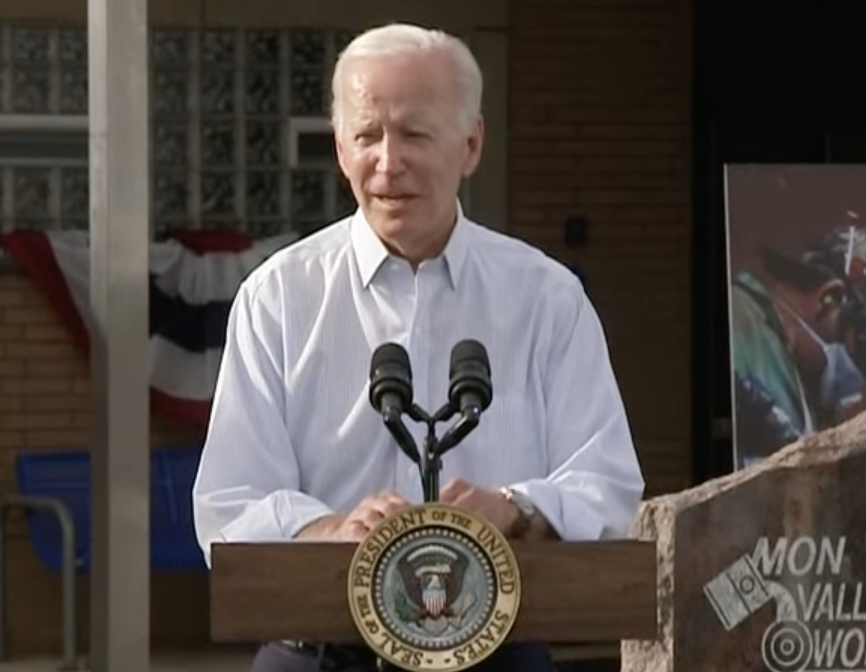President Joe Biden’s campaign announced Sunday it is launching a $25 million TV ad buy, targeting key states and markets across the U.S. And one of those key states is the Keystone State.
The ads are scheduled to run in Philadelphia, Pittsburgh, and Wilkes-Barre-Scranton, more markets than any other targeted state. They include Arizona, Georgia, Michigan, Nevada, North Carolina, and Wisconsin.
A Biden campaign spokesperson portrayed the ad as a way to emphasize his view and vision of America.
“This historic buy ensures that the president’s message reaches all Americans where they receive their news, and sends a clear sign that we are investing in an aggressive, meaningful, and effective paid media strategy,” Julie Chavez Rodriguez, Biden campaign manager, said in a statement. “President Biden is amplifying his winning message and leadership as a president for all Americans.”
But Biden has been “amplifying” his campaign in Pennsylvania since his first day in office, making nearly 30 visits to his home state since taking office. It’s an indicator, pundits say, both of the importance of Pennsylvania in the Electoral College vote, and Democrats’ concerns about holding it in 2024. Biden beat incumbent President Donald Trump by just 81,000 votes out of 7 million cast in 2020, and Trump edged Hillary Clinton by 44,000 votes four years earlier.
Trump is not mentioned in the ad but does appear in it.
“Going up on TV this early is a signal flare that Biden and the Democrats know they’re in trouble in traditionally blue states like Pennsylvania,” Jason Miller, senior advisor for the Trump campaign, told DVJournal. “Attacking UAW jobs, pushing a radical green agenda, and the worst inflation record in a generation will do that.”
Miller compared the ad buy to Hillary Clinton’s 2016 campaign in Wisconsin and Michigan, which scrambled to excite voters. “Canaries in the coal mine!” he posted on social media.
The president’s numbers aren’t the best in Pennsylvania. A Quinnipiac University Poll from June showed Trump leading Biden 47-46 in the Keystone State.
It was worse for Biden in the Delaware Valley. A July co/efficient poll for DVJournal revealed the Philly suburbs don’t want Biden on the ballot next year, with just 33 percent supporting a second term. Only 43 percent of Delaware Valley voters approved of Biden’s performance in the White House, and 59 percent thought the U.S. was on the wrong track. That despite the GOP’s support lingering under 40 percent.
It caused Ryan Munce of co/efficient polling to wonder what was happening with the Biden campaign. “I’m sure they are seeing the same numbers in the Pennsylvania suburbs that we are seeing and are rightfully concerned,” said Munce. “What I can’t understand, however, is why they are sticking with the ‘everything is great, don’t believe your eyes’ messaging philosophy.”
He speculated Biden’s strategy could be a case of listening to so-called “yes, people” without considering alternatives. “The fact that they are using that messaging indicates that being honest with voters about the situation the country is in just doesn’t perform well for them,” Munce said. “I’m sure it tested well with their base, which is willing to turn a blind eye to the impact of Biden’s policies. But we know this tone-deaf approach does not play well with independent and swing voters.”
Discomfort with Biden may be impacting the entire country. His job approval hovers around 41.1 percent, according to RealClearPolitics. He hasn’t cracked 50 percent since an early May Economist/YouGov survey. RCP’s “direction of the country” data is even worse. It hasn’t cracked 40 percent since last December.
Yet, Democrats say they’re committed to backing Biden in what they see as a tough campaign. Sen. John Fetterman (D-Pa.) said last month he expected the 2024 election to be even closer than it was in 2020 should it be Biden-Trump II. Fetterman still expects Biden to win reelection.
Republican presidential candidates, likely sans Trump, will debate on Fox TV Wednesday in Wisconsin. Trump said Sunday he will not participate in the first debate — and possibly not any of the debates — and is instead posting a prerecorded interview with former Fox News host Tucker Carlson.

